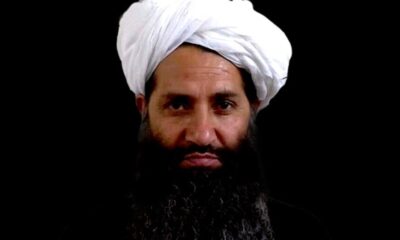Latest News
Afghan-Iranian officials move to strengthen relations and tighten border controls
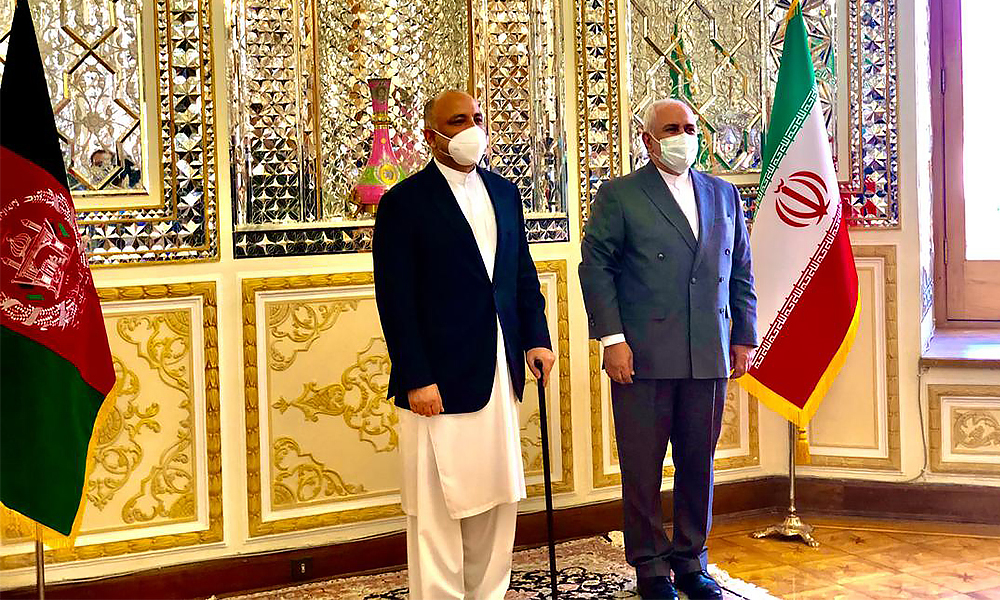
Afghanistan’s acting minister of foreign affairs Mohammed Haneef Atmar, and his Iranian counterpart Mohammad Javad Zarif have agreed to take all necessary measures to prevent illegal border crossings and human trafficking by stepping up controls over the shared boundary.
This decision was announced late Monday night in a joint statement issued by the two officials as Atmar wrapped up a two-day official visit to Afghanistan’s neighboring country.
According to the statement, the security-frontier committee and the committee on the legalization of residence of nationals of the two countries on each other’s soil were assigned to adopt the necessary measures to ensure the security of the common border in order to prevent illegal travel, human trafficking, and smuggling.
“In this regard, the two sides highlighted the need for the Afghan security forces to be present in the border outposts emptied in Afghanistan, and for the Islamic Republic of Iran to facilitate issuing visas,” read the statement.
ﺑﯿﺎنیه ﻣﺸﺘﺮک وزرای اﻣﻮر ﺧﺎرجه ﺟﻤﮭﻮری اﺳﻼﻣﯽ اﻓﻐﺎﻧﺴﺘﺎن و ﺟﻤﮭﻮری اﺳﻼﻣﯽ اﯾﺮانhttps://t.co/vdQBJsllYl pic.twitter.com/GIcIjYkmYP
— MFA Afghanistan 🇦🇫 (@mfa_afghanistan) June 22, 2020
Both sides also stressed the “need for the border guards of the two countries to monitor and control the common borders strictly and effectively, and undertook to prevent illegal border-crossing, human trafficking, and smuggling of drugs and any other items into the territory of each other.”
An agreement was also reached regarding mutual cooperation in observing international health regulations at the border crossings.
Numerous meetings were held during the two-day visit where a wide range of issues was discussed, including the expansion of relations between the two countries in various fields within the framework of eight working committees.
This includes committees on comprehensive documentation, legalization of residence of nationals, border cooperation, labor, water, cultural cooperation, energy, and health issues.
The two sides stated that in order to institutionalize and organize sound bilateral relations, Afghanistan and Iran would proceed with negotiations to finalize a comprehensive document on strategic cooperation and have this document finalized and ready to be signed within three months.
Iran also stated that it welcomed the peace process efforts and expressed readiness to help facilitate intra-Afghan negotiations. They also stated they would be willing to host such negotiations.
Both sides emphasized the need to reduce violence in Afghanistan “with the purpose of building trust and creating a positive atmosphere in order to launch the intra-Afghan negotiations as soon as possible, achieve a lasting ceasefire, and establish sustainable peace.”
“Considering the significance of regional and international consensus on the establishment of peace and security in Afghanistan, the two sides stressed the need to strengthen the regional and international cooperation and consultations and activate the capacities available in the region with the purpose of facilitating the negotiations and supporting the Islamic Republic of Afghanistan’s establishment,” read the statement.
Both countries agreed that there was also a need to carry out joint programs in promoting common areas including that of the heritage of language, religion, and culture, as well as educational cooperation.
Detailed discussions were also held on recent incidents that resulted in human fatalities.
This comes after tension heightened early last month after reports emerged that Iranian border guards had allegedly beaten and thrown about 50 Afghan migrants into the Harirud river.
Iran has refuted these claims and said the incident, which resulted in the death of some migrants, happened on the Afghanistan side of the river.
The statement, however, indicated that Iran had informed the Afghan side of progress around ongoing investigations, and both sides agreed to adopt measures to prevent any recurrence of such an incident.
Discussions on boosting economic ties were also held and the two sides agreed on a number of cooperation initiatives in the transport and transportation sectors. Chabahar Port was highlighted as being the “driving engine of trade-transit cooperation in the region.”
Both sides agreed there was a need to provide welfare facilities at border crossings and that joint action was needed as a matter of urgency to “repair the infrastructure and the asphalt road for motor vehicles at the Dogharoun border crossing.”
Meanwhile, on Tuesday, Iran’s Foreign Ministry Director-General for West-Asia Seyed Rasoul Mousavi hailed Atmar’s visit.
“As an expert, I would like to say the visit of FM Atmar to Tehran was a very important and comprehensive one,” Mousavi Tweeted on Tuesday.
“Negotiations & agreements were reached in all areas. The joint statement of the visit is cold water on the fire of the ill-wishers of Iran & Afghanistan relations,” he added.
Iran has over the past 40 years hosted millions of Afghan refugees. According to Iran, it currently hosts about 1.5 million Afghan refugees who are living in the country illegally, in addition to about 800,000 documented
Latest News
Afghanistan-Iran-Europe railway corridor activated

The Iranian Embassy in Kabul announced on Thursday that the Afghanistan-Iran-Europe railway corridor has become operational.
In a statement, the embassy said the first export shipment from Afghanistan has started its journey through the Afghanistan-Iran railway corridor to Turkey and Europe.
The corridor was activated with the presence of the Iranian Consul General in Herat and the governor of the province, the statement read.
The statement added that the activation of this corridor, with Iran’s cooperation, will contribute to the improvement of Afghanistan’s economy.
Latest News
Amnesty international urges Pakistan to halt Afghan deportations
Amnesty International said that all Afghan nationals are required to leave the cities of Islamabad and Rawalpindi by 31 March
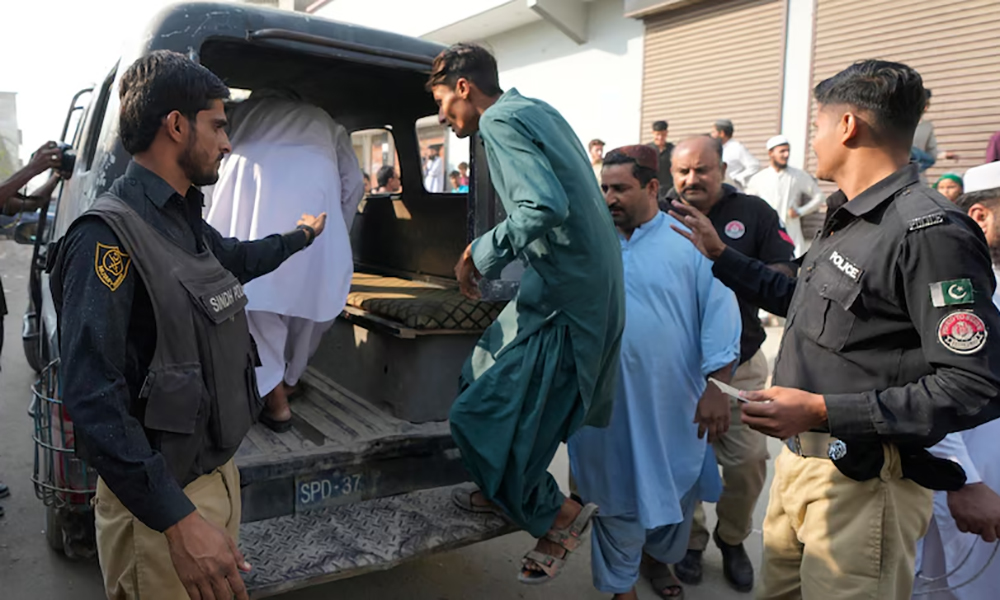
Amnesty International on Wednesday called on Pakistan to immediately withdraw its “Illegal Foreigners Repatriation Plan”, which primarily targets Afghan refugees, ahead of the authorities’ 31 March deadline.
Pakistani government has asked all “illegal foreigners” and Afghan Citizen Card holders to leave the country before March 31, warning they would otherwise be deported from April 1.
Amnesty International said that all Afghan nationals are required to leave the cities of Islamabad and Rawalpindi by 31 March
It said that “arbitrarily and forcibly expelling Afghan nationals, including refugees and asylum seekers, will only add to their plight”.
“The Pakistani government’s unyielding and cruel deadline, which is less than a week away, to remove Afghan refugees and asylum seekers from two major cities, resulting in the deportation of many at risk, shows little respect for international human rights law, particularly the principle of non-refoulement,” said Isabelle Lassée, deputy regional director for South Asia at Amnesty International.
The exact details of the Pakistan government’s ‘Illegal Foreigners Repatriation Plan’ used for deportations has never been made public, but it comes amid a campaign to wrongfully demonize Afghan nationals as so-called criminals and terrorists, Amnesty said.
Isabelle Lassée said that the Pakistani government is only making “a scapegoat of a community that has long been disenfranchised and fleeing persecution.”
Human rights lawyer Moniza Kakar pointed out that forcing Afghan refugees to relocate even within Pakistan is devastating for families. “Many PoR card holders are people who’ve been here for decades, asking them to relocate means you’re asking them to leave homes, businesses, communities and lives they’ve built for years,” she said.
Lawyer Umer Gillani, who has challenged the deportation orders in Pakistan’s Supreme Court and Islamabad High Court, argued that the March 31 deadline was not legally enforceable. “The official notification has not been issued under any particular law; it is just an executive instruction,” he stated.
Meanwhile, the International Organization for Migration (IOM) reported a sharp decline in Afghan returns and deportations during the first half of March. Between March 1 and 15, returns dropped by 67 per cent, while deportations fell by 50 per cent compared to the previous reporting period (February 16-28).
Latest News
IEA leader congratulates Afghans on Eid ul-Fitr
The IEA leader also strongly condemned the Israeli military strikes against the “oppressed and defenseless” Palestinians as a “great injustice and barbarity.”
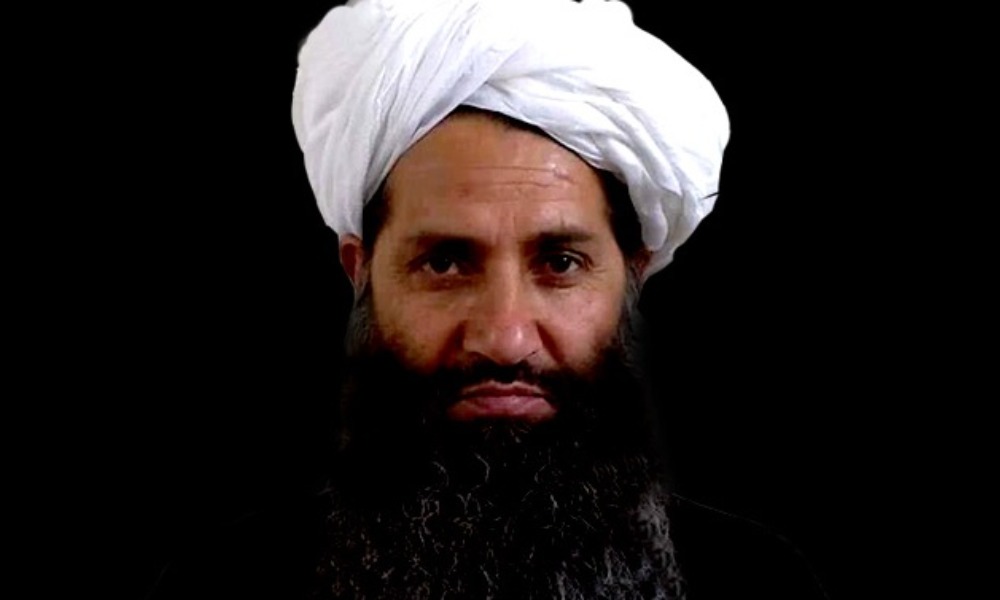
Supreme leader of the Islamic Emirate of Afghanistan (IEA), Mawlawi Hibatullah Akhundzada, congratulated the Afghan people on the occasion of Eid ul-Fitr, calling on them to be strong in their beliefs and not to follow the path of Satan.
In his Eid message, released on Thursday, Mawlawi Hibatullah stated, “Dear Muslim brothers! let us renew our commitment to Allah, the Almighty, and strengthen our resolve to avoid His disobedience and not follow the path of Satan.”
He asked Afghans to thankful to Almighty Allah for security across the country.
“There was a time when on this very day, the funerals of our Afghan brothers were carried out, bombs fell upon us, our homes were searched, and we were dragged into prisons. But now, thanks to Allah, this day has transformed into one of peace and security,” he said.
IEA’s supreme leader reiterated the Islamic Emirate’s resolve to implement Shariah law, instructing courts to ensure judicial rulings adhere strictly to Islamic laws. The message again reiterated that implementing Shariah was a fundamental objective of the Islamic Emirate’s jihad and sacrifices.
On education, Mawlawi Hibatullah said that the educational institutions are tasked with giving serious attention to the correction of beliefs and actions across all educational sectors, aligning their curricula with Sharia, and providing proper training and education to the youth.
Additionally, he cautioned against “harmful propaganda spread by hostile intelligence agencies, who seek to sow despair or create unnecessary concerns about poverty and economic challenges.”
“The Islamic Emirate, with the help of Allah Almighty, is doing all it can to improve your lives.”
Condemnation of Israeli Attacks on Palestine
The IEA leader also strongly condemned the Israeli military strikes against the “oppressed and defenseless” Palestinians as a “great injustice and barbarity.”
“We support the legitimate demands of the Palestinian people and urge the rest of the Islamic world to, as much as possible, support the Palestinians, so they can regain their usurped rights, be freed from the oppression and aggression of the Zionist regime, and put an end to the ongoing atrocities and injustice there,” he said.
-

 International Sports4 days ago
International Sports4 days agoRCB bring fireworks to opening night of IPL 2025
-
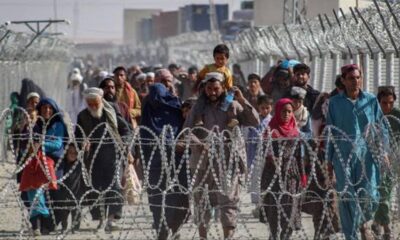
 Latest News4 days ago
Latest News4 days agoTorkham border reopens for pedestrians
-
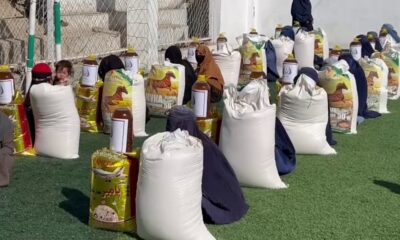
 Latest News4 days ago
Latest News4 days agoBayat Foundation distributes food aid to dozens of needy families in Balkh
-

 International Sports3 days ago
International Sports3 days agoIPL 2025: Sunrisers on a batting rampage; triumph over Rajasthan Royals
-
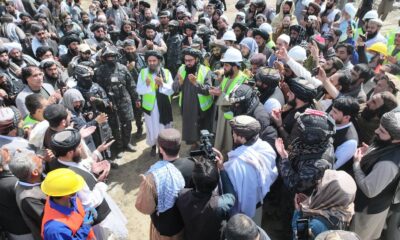
 Business4 days ago
Business4 days agoDeputy PM inaugurates launch of Arghandi Transport Terminal Project in Kabul Province
-

 Latest News3 days ago
Latest News3 days agoEU says girls’ education crucial for Afghanistan’s long-term prosperity
-

 Sport3 days ago
Sport3 days agoACB names Afghanistan A squad for tri-nation series
-
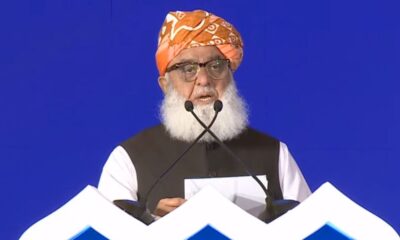
 Latest News4 days ago
Latest News4 days agoPakistan’s mistakes played significant role in rise of terrorism: Maulana Fazl-ur-Rehman










